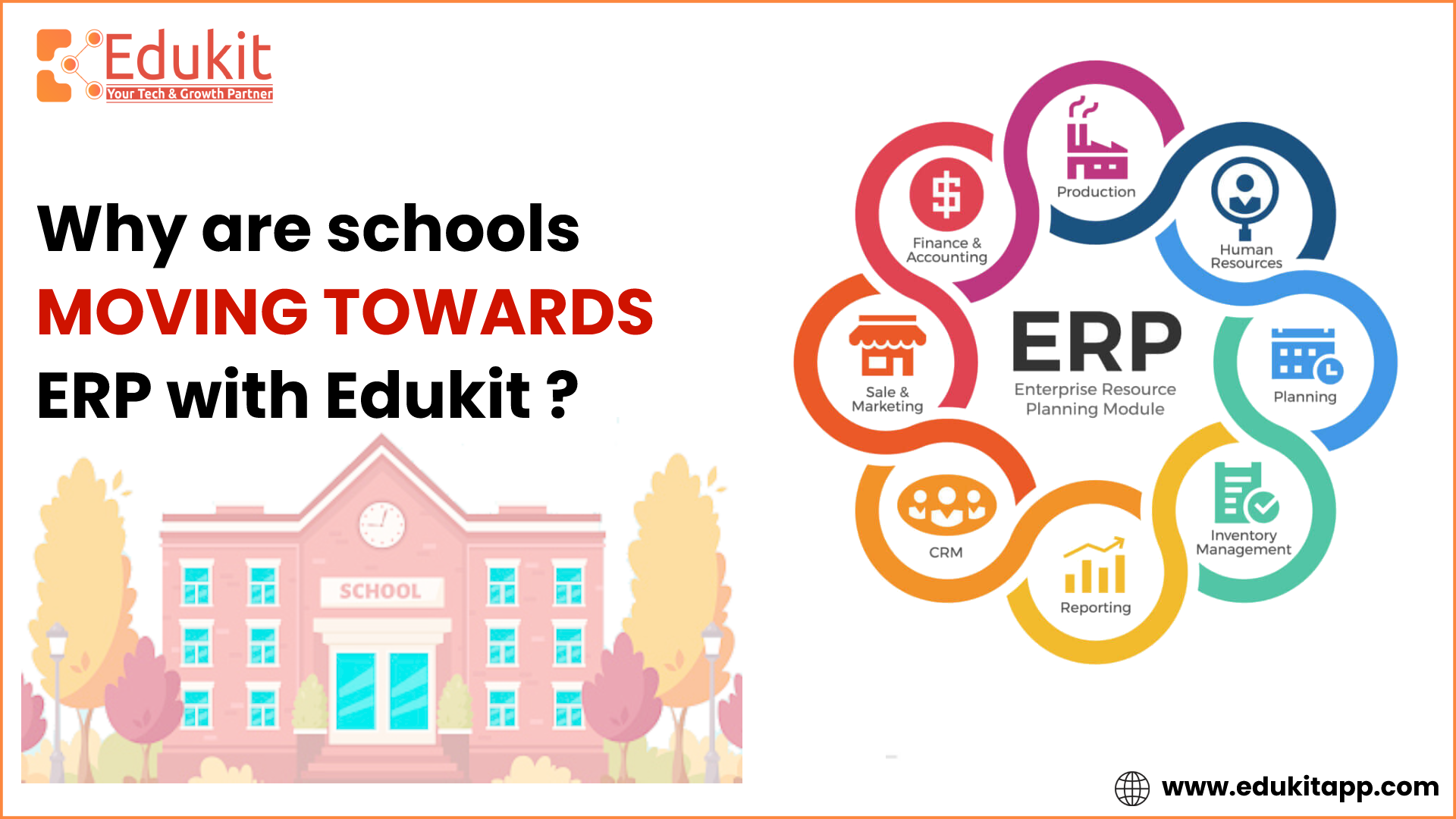Why are schools moving towards Erp with “Edukit” ?
Schools are moving towards Enterprise Resource Planning (ERP) systems with Edukit because they offer a range of benefits, such as:
Improved efficiency and automation of administrative tasks, such as student enrollment, grade tracking, and financial management.
Enhanced data management, providing a centralised repository of information, which helps schools make informed decisions.
Improved communication and collaboration between staff, students, and parents through integrated portals and mobile apps.
Increased transparency and accountability by providing real-time data to stakeholders.
Better decision-making by providing an integrated view of operations, finances, and performance.
Overall, ERP systems are helping schools streamline their operations, save time and resources, and improve the quality of education.
What erp means
Enterprise Resource Planning (ERP) is a software solution that integrates different business functions into a single, centralized platform.
The main purpose of ERP is to streamline operations, improve data management, and facilitate better decision-making. ERP systems gather data from various sources within an organization, such as financial systems, human resources systems, and supply chain management systems, and integrate them into a single database.
This database provides real-time access to business information and enables staff to collaborate and communicate more effectively. ERP systems also automate many business processes, freeing up staff to focus on higher-level tasks.
The software provides a range of reporting and analysis tools that allow organizations to make informed decisions and track performance. Overall, ERP systems play a crucial role in helping organizations optimize their operations, improve efficiency, and enhance their overall competitiveness.
How erp works
Enterprise Resource Planning (ERP) systems work by integrating different business functions into a single, centralized software platform. Here's a general overview of how ERP systems work:
Data Collection: ERP systems gather data from various sources within the organization, such as financial systems, human resources systems, and supply chain management systems.
Data Integration: The data is then integrated into a single database, providing a centralized information repository.
Data Processing: The ERP system processes the data and generates reports, dashboards, and alerts that provide insights into business performance.
Workflow Automation: ERP systems automate many business processes, such as purchase orders, invoicing, and payroll, freeing up staff to focus on higher-level tasks.
User Access: Staff and other stakeholders can access the ERP system through a web interface or mobile app. This allows for real-time access to business information and enables collaboration and communication between different departments.
Reporting and Analysis: The ERP system provides a range of reporting and analysis tools that allow organizations to make informed decisions.
ERP systems provide a single, integrated platform that streamlines operations and improves decision-making.
Benefits of erp systems for schools
Enterprise Resource Planning (ERP) systems provide a range of benefits to schools, including:
Improved Student Information Management: ERP systems provide a centralized repository of student information, making it easier for staff to track student progress and provide feedback.
Automated Financial Management: ERP systems automate many financial processes, such as invoicing, budgeting, and expense tracking, reducing the risk of manual errors and freeing up staff to focus on higher-level tasks.
Enhanced Communication and Collaboration: ERP systems provide portals and mobile apps that enable staff, students, and parents to communicate and collaborate more effectively, improving the overall quality of education.
Increased Transparency and Accountability: ERP systems provide real-time data that allows schools to track performance, identify areas for improvement, and make informed decisions.
Improved Decision-Making: ERP systems provide a range of reporting and analysis tools that allow schools to make informed decisions based on data-driven insights.
Scalability: ERP systems are designed to scale as schools grow, making it easy to add new functionality and integrate with other systems as needed.
Improved Security: ERP systems provide a secure, centralized platform for storing sensitive student information, reducing the risk of data breaches and unauthorized access.
ERP systems play a crucial role in helping schools optimize their operations, improve efficiency, and enhance the quality of education.
How to choose the best erp company for your schools
Choosing the best ERP company for your school can be a complex and time-consuming process. But can we easily minimize this search by choosing a company like Edukit or we have to remember some key points while searching for an erp company for your school/Institute -
Customization: Choose an ERP company that offers a high degree of customization to meet the specific needs of your school, including your academic structure, student management processes, and financial management requirements.
Integration: Look for an ERP company that offers seamless integration with other systems and tools used by your school, such as student information systems, learning management systems, and financial management systems.
User-Friendliness: Choose an ERP system that is easy to use and understand, with intuitive interfaces and self-help resources, to ensure that staff and students can use it effectively.
Support: Consider the level of support offered by the ERP company, including phone and email support, training, and documentation. Choose a company that offers responsive and reliable support, to ensure any issues are resolved quickly.
Cost: Consider the total cost of ownership of the ERP system, including software licensing, implementation, training, and ongoing maintenance and support costs. Choose an ERP system that provides value for money and is affordable for your school.
Reputation: Look for an ERP company with a proven track record of delivering high-quality ERP systems to schools, and consider feedback from other schools and industry experts.
Scalability: Choose an ERP system that is designed to scale as your school grows, making it easy to add new functionality and integrate with other systems as needed.
Security: Consider the security features offered by the ERP company, including data encryption, user authentication, and disaster recovery. Choose a company that provides robust security features to protect sensitive student information.
By considering these factors, you can choose an ERP company that provides the best solution for your school and enhances the quality of education.

